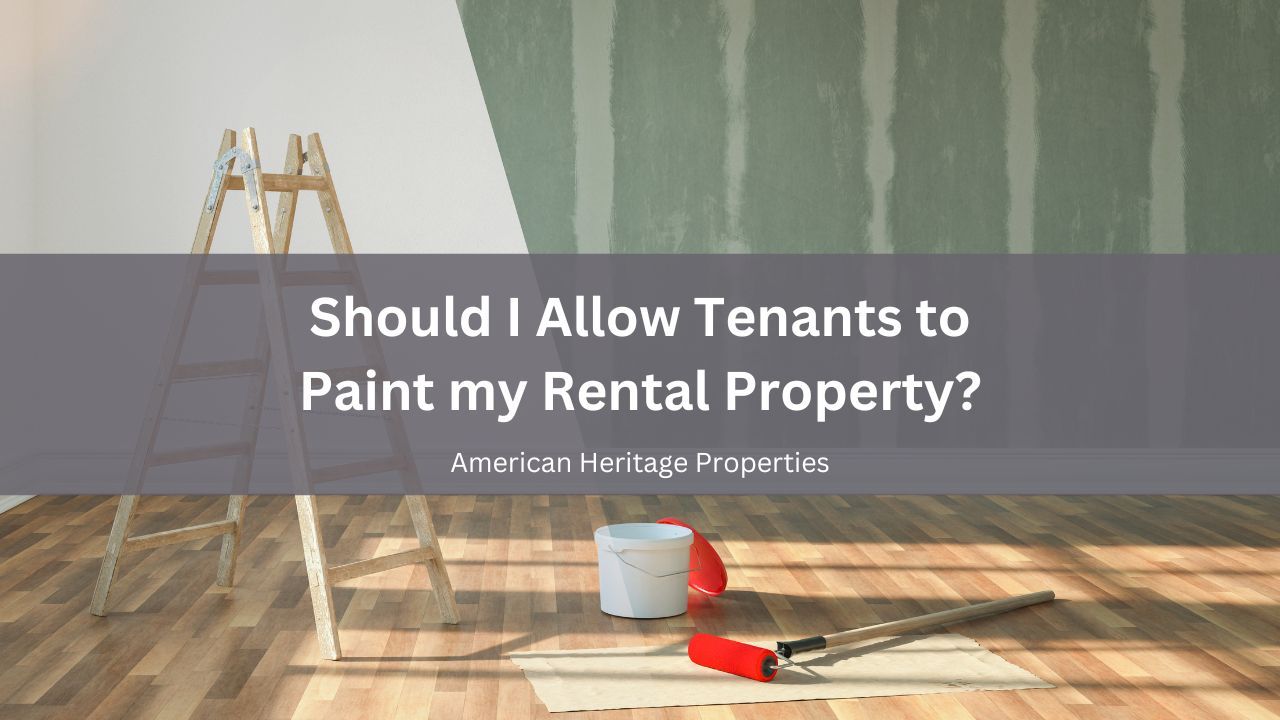Should I Allow Tenants to Paint my Rental Property?

Key Takeaways
- Allowing tenants to paint can boost retention, attract high-quality renters, and make your property more competitive.
- However, it also carries risks like poor workmanship, bad color choices, and increased maintenance costs.
- If you decide to allow it, protect your investment with clear lease guidelines, professional requirements, and repaint policies.
As a landlord, making your property feel homey and full of character is in your best interest. This can help you drive up rental demand, reduce vacancy rates, and maximize your ROI through increased rental rates. But, how exactly can you make your rental property feel more like a home? Often, landlords will do that by adding decorations and furnishings. Recently, though, a trend has emerged where landlords are allowing their tenants to paint their rental properties. However, this is something that requires careful consideration.
In this guide, we at American Heritage Properties will explore whether or not to allow your tenants to paint their rentals!
Pros of Allowing Tenants to Paint Your Rental Property
Allowing a tenant to paint their rented premises can benefit your rental investment in multiple ways. Below are some of the benefits:
Longer Leases
Most landlords don’t allow their tenants to personalize their space. Consequently, tenants will
usually move around until they can find a landlord who can allow them to personalize their homes to their liking. And when they find such a landlord, they will usually rent the home for as long as they can.

Solid Landlord-TenantRelationship
By allowing the tenant to personalize their space, you’ll be showing them that you care for their wellbeing. In turn, they can make up for the kind gesture by renting longer and caring for the property.
Make Your Property More Competitive
Most California landlords don’t allow their tenants to make changes to their rental property. If you go against this norm, you can make your property stand out among the competition.
Charge More Rent
As already mentioned, not many landlords allow their tenants to make changes to their rental premises. But if you do, you can make your property stand out, which can increase rental demand and even the rental price.
Attract High-Quality Tenants
When tenants can personalize their space, they are more likely to feel invested in the property and take good care of it. Consequently, this can lead to less normal wear and tear and potentially fewer maintenance issues for you.
Cons of Allowing Tenants to Paint Your Property
Below are the cons of allowing tenants to paint your rental property.
- Most lease agreements require tenants to return their rented premises in the move-in condition, less normal wear and tear. However, some tenants move out without doing so, leaving the landlord with the task of renovating the premises.
- The tenant may choose to DIY the paintwork, which might result in messy or uneven work. This can leave your walls looking worse than before.
- The tenant may go for dark or bold colors, which can be difficult and expensive to cover up later.

Should You Allow Tenants to Paint Your Rental Property?
Before making the decision, carefully consider both the benefits and the challenges. If you find that the challenges outweigh the benefits, then let prospective tenants know that they cannot paint your rental. You can also include a clause in the lease that mentions that making property alterations is a serious violation. Mention the potential consequences and fees as well. On the other hand, if you agree to tenants painting your walls, make sure you mention how the tenant must go about the process. The following are the rules you can require the tenant to follow when painting your rental premises.
Only Allow Them to Paint Certain Rooms or Walls.
Allowing tenants to paint the whole property may not be a great idea. If anything goes wrong, the restoration costs can be hefty on your bottom line. As such, only allow the tenant to paint in certain rooms or walls. For instance, allowing the tenant to paint accent walls on designated areas.
Require the Tenant to Hire Professionals
Not everyone can paint professionally. And the last thing you want is a messy paint job that is going to be expensive and time-consuming to fix. Professional painters have years of experience and have honed their skills over time. You can rely on their expertise to deliver quality results on any painting project. This will give you peace of mind knowing the paint job is going to meet your standards.

Require the Tenant to Reverse the Changes Before Moving Out
As already mentioned, most landlords require their tenants to return their rented premises in the move-in condition, less normal wear and tear. This ensures that the property is rent-ready for the next tenant. Therefore, require a tenant who repaints the premises to revert to the property’s original color. If the tenant doesn’t do so, deduct the appropriate costs from their security deposit.
Require the Tenant to Pay a Fee
Protect your San Diego property from difficult tenants by charging a paint fee. Despite requiring the paint job to be done by a professional, the tenant may still choose to go DIY to save on costs. The fee can help you pay for any liabilities that result from poor paint jobs. And once the tenant has moved out, you can use the money to repaint the unit back to the original palette.
Bottom Line
Should you allow tenants to paint your rental property? Carefully weigh both the pros and cons of doing so. On one hand, it can help make your property more competitive in the rental market. On the other hand, though, it can lead to financial ruin if not done well. Luckily for you, setting up some guidelines can help you avoid any financial liabilities that come with allowing tenants to paint your rental premises. If you have a question or need an expert property manager, look no further than American Heritage Properties. Get in touch to learn more!









